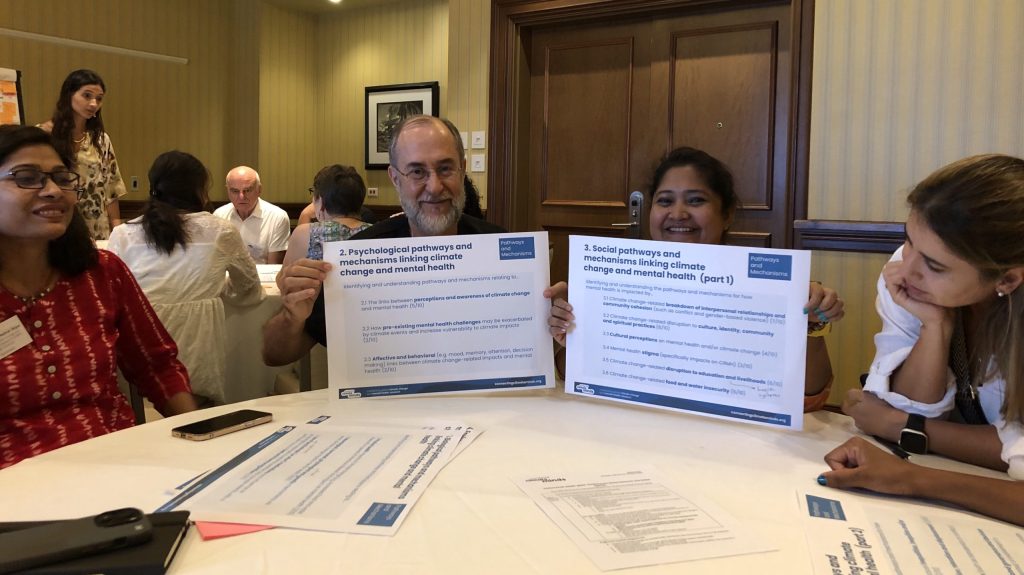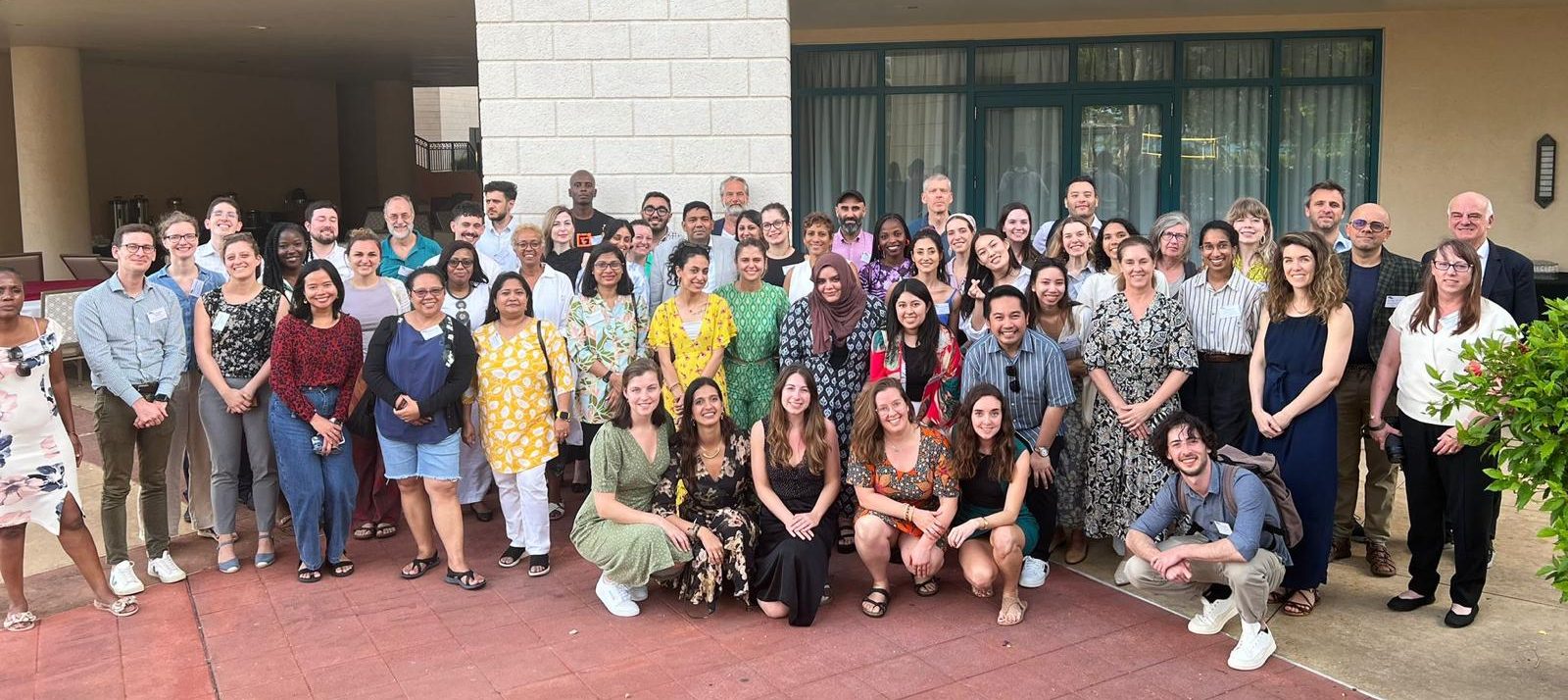Connecting Climate Minds Global Event recap
The Connecting Climate Minds (CCM) Global Event in Barbados involved 70 in-person participants and more than 600 virtual participants. Together, we celebrated the initiative’s first year of work led by seven regional communities, youth, Indigenous Nations and Peoples, and small farmers and fisher peoples.
At the Global Event:
- The Connecting Climate Minds Hub was launched – an innovative digital platform designed as a collaborative space for researchers, policymakers, educators, and community groups to share their knowledge, resources, and experiences on the climate-mental health nexus including the CCM outputs.
- The global event featured keynote sessions delivered by prominent experts in climate change and mental health, along with the marketplace, regional spotlight sessions, and breakout sessions to discuss the Global Research and Action Agenda.
- “Need for measurement and data” on climate-related mental health impacts, “community” and “co-creation” were the key recurring themes highlighted by participants.
- The first Global Research and Action Agenda on climate change and mental health was discussed and will be finalised for launch in July.
- The global event also launched the key CCM outputs, including ten regional and community research and action agendas, lived experiences, case studies and toolkits. The CCM community discussed opportunities to support the capacity of the Regional Communities of Practice to fulfil the imperative agendas created through the project.
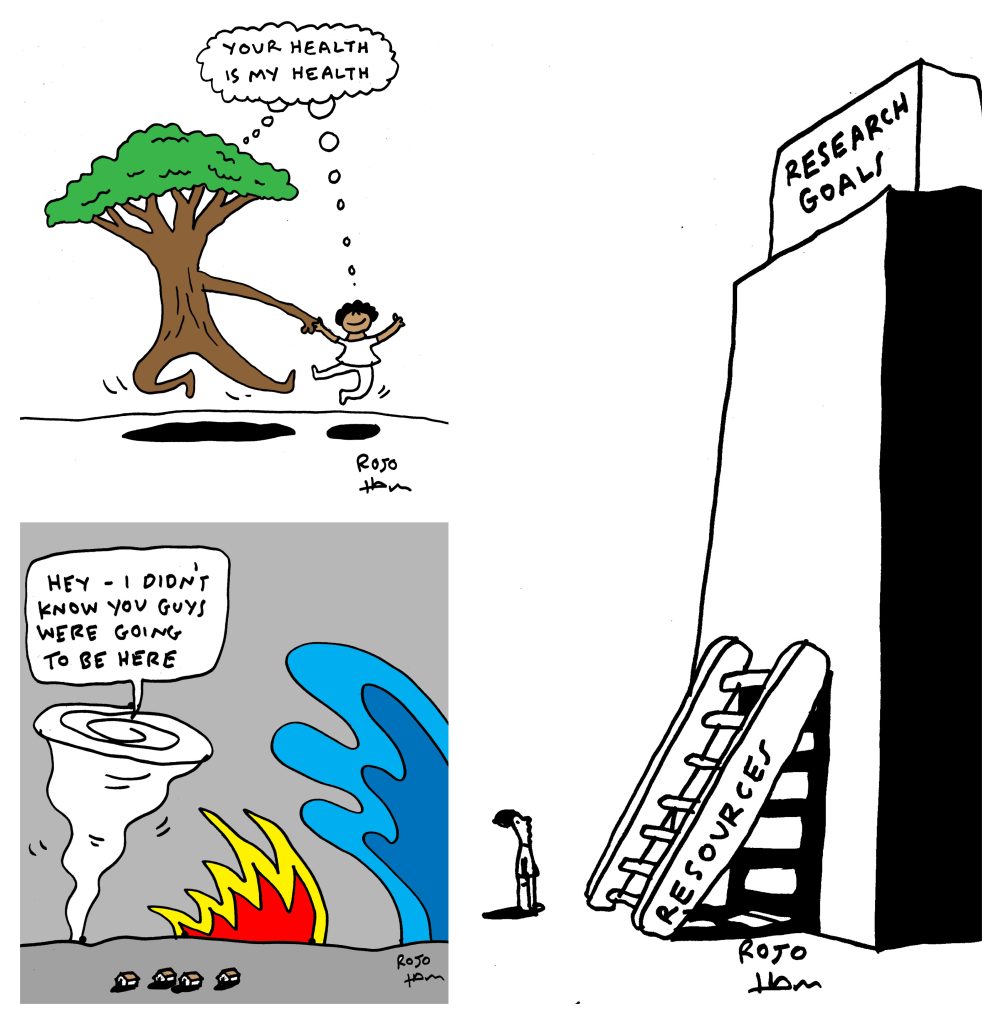
Catalysing a global research community at the intersection of climate change and mental health
Connecting Climate Minds (CCM) is a global Wellcome-funded project that aims to build and catalyse a collaborative climate change and mental health field with two key, intertwined aims:
- Develop an aligned and inclusive agenda for research and action that is grounded in the needs of those with lived experience of mental health challenges in the context of climate change, to guide the field over the coming years.
- Establish connected communities of practice for climate change and mental health in seven global regions (designated by the Sustainable Development Goals) that are equipped to enact this agenda.
Over the last year, more than 870 experts from over 80 countries participated in a series of 21 dialogues. These spanned all seven global regions alongside dialogues specifically led by and for youth, Indigenous Nations and Peoples, and small farmers and fisher peoples who shared their perspectives, firsthand experiences and efforts concerning the mental health impacts of climate change and benefits of climate action. The 3-day global event helped to strengthen meaningful connections and synergies across the different communities of practice and also worked to synthesise the dialogue outcomes into an aligned set of global research and action priorities for climate and mental health that will be published later this year.
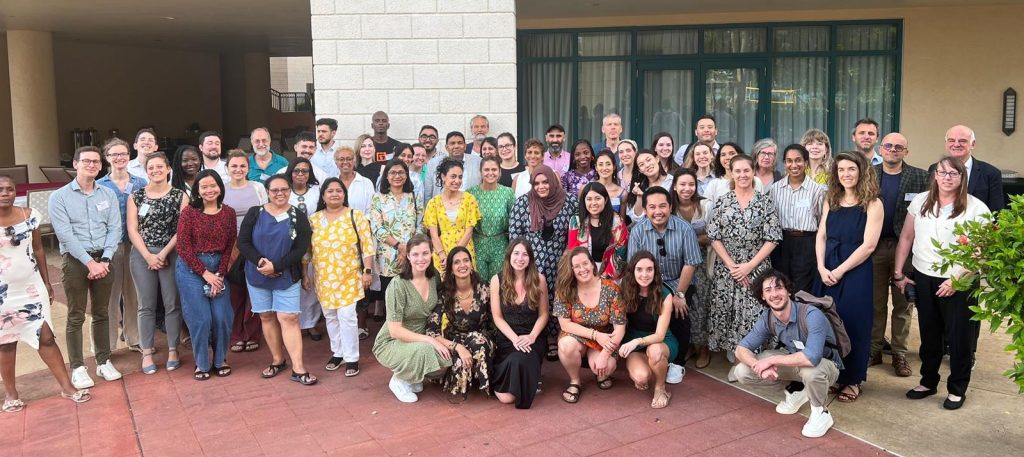
Why was Barbados our chosen destination?
The University of the West Indies, the project’s Regional Community Convenor for Latin America and the Caribbean (LAC), warmly welcomed the global CCM community in Barbados. Their unwavering support made it possible to host the Global Event in “this corner of the world”, as Ambassador Gillian Bristol, Project Team Lead for Latin America and the Caribbean and Director of the Latin-American-Caribbean Centre, called the region during the opening ceremony. Despite the beauty this corner of the world possesses, it is evident that this island nation, like many others in the Caribbean, is severely affected by climate change which includes, but is not limited to, sea level rise, increased temperatures, and increased hurricane intensity. The impacts of this on the people of Barbados include reduced coastal and water resources, disrupted health services, reduced fish stocks and damage to boats, which negatively affects the fishing industry. These impacts in turn affect tourism.
Ambassador Gillian Bristol said: “Only one word comes to mind when we speak about climate change, that is ‘earth-shattering’. It is one of the most all-encompassing expressions of what climate change means for our world today”. Ambassador Bristol emphasised: “Action is when we change earth-shattering into earth-surviving, earth-thriving, and earth-sustaining. What is the point of research without action?”
Action is already underway. During the global event, the LAC region showcased how Barbados is tackling water scarcity to protect the mental health of Barbadian youth.
Fieldtrip: Local impacts of climate change on mental health
At a field trip in nearby Hastings Beach, participants had the opportunity to listen to and learn from Dr Shelly-Ann Cox, Chief Fishery Officer, and Mr Carlos Ginkels from the National Conservation Committee, who spoke about the significant climate change-driven increase in sargassum seaweed. They discussed how the increased build-up of sargassum seaweed prevents local fisherpeople from getting out on their boats and catching fish, impacting food security. Furthermore, when sargassum seaweed decomposes, it creates a gas which causes respiratory illnesses and in some cases produces hydrogen sulphate. This makes it hard for locals, especially older people and youth, to use the beaches, reducing their access to green space. Apart from the people living on the island being affected frequently, it is also affecting tourists which subsequently creates worry amongst those working in the tourism sector.
The removal of sargassum seaweed, for which they developed systems for storage as well as management of collection, resulted in jobs. Further, farmers in the region are trying to use it as a fertilizer demonstrated by this case study example of Trinidad.
Dr Cox highlighted: “Every person at every social level is positively and negatively impacted by sargassum seaweed. Scientists say that sargassum seaweed is here to stay, so we need to find ways to live with it and find opportunities.” The Climate Cares Centre is grateful to Barbados Tourism Marketing Inc. for their support in organising this field trip which was a great enrichment for participants to learn about the climate-related impacts on the communities living in Barbados.
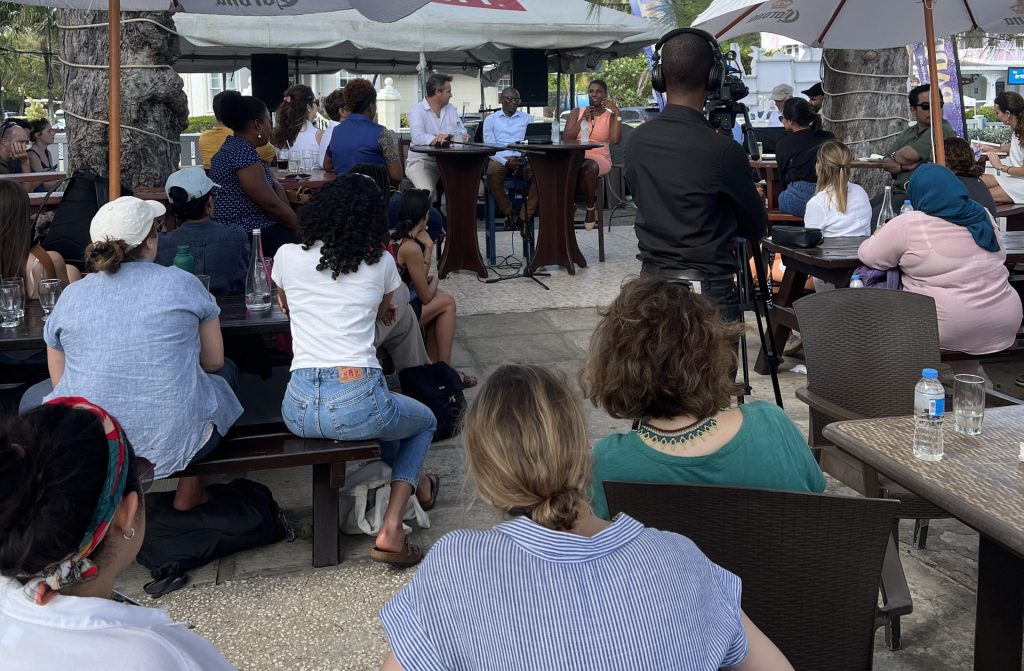
Capturing key highlights and insights
The Global Event commenced with an opening address by Dr Emma Lawrance, Lead of Connecting Climate Minds and the Climate Cares Centre, one of the Institute of Global Health Innovation’s Centres of Excellence. Dr Lawrance emphasised that “connection” lies at the core of the project by fostering interlinkages across people from different countries and disciplines – including and particularly those living with and responding to the mental health consequences of escalating climate hazards, and with unique resilience capacities.
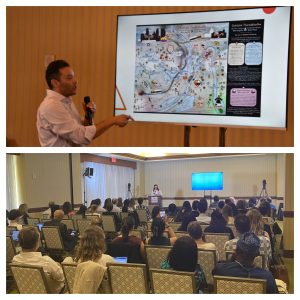
Keynote talks
The first keynote address was presented by Prof Pamela Collins, who serves as the Chair of the Department of Mental Health at the Johns Hopkins Bloomberg School of Public Health and co-chair of the CCM Advisory Board. A renowned figure in global mental health, Prof Collins reminded us that mental health challenges and climate change are among the most crucial issues globally. She also shared insights from her pioneering work on suicide prevention within Arctic Indigenous communities through the Rising Sun Initiative.
Dr Marina Romanello, Executive Director of the Lancet Countdown and CCM Advisory Board member, shed light on why this work on climate change and mental health is so important. Dr Romanello argued that countries’ lack of consideration for climate-related mental health impacts represents a “fragile first line of defence”. Only 8 out of 83 countries reported having a climate-informed health early warning system (HEWS) for mental and psychosocial health while less than 18% of national vulnerability and adaptation assessments identified climate-sensitive risks to mental and psychosocial health.
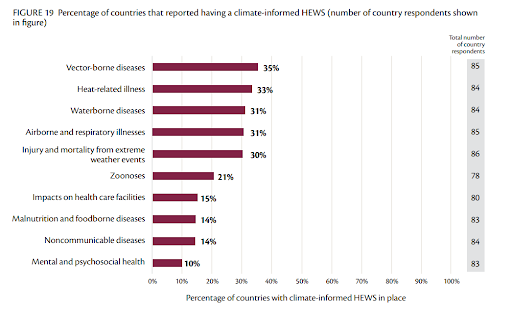
Dr Kyle Hill, Assistant Professor of Environmental Health Sciences at the University of Minnesota, delivered the concluding keynote. He highlighted the critical role of Indigenous communities in protecting 80% of biodiversity despite only inhabiting 22% of the Earth’s surface. Dr Hill’s presentation delved into the interplay between historic and current structural inequities, colonialism, and the mental health impacts of climate change. Further, he emphasised the correlation between positive mental health, resilience, and connections to place, environment, spirituality, cultural and traditional activities. He ended with: “The land is us, we are the land.”
Marketplace and Regional Spotlight: Showcasing Community Efforts
To celebrate the breadth of wisdom and diversity of the CCM community voices, participants had the opportunity to hear from the seven Regional Communities of Practice who showcased a snapshot overview of the work that was undertaken in the past year with their communities. They highlighted key elements of their Regional Research and Action Agenda including two burning research priority questions and two priority actions that came out of their regional dialogues. The audience was also enlightened by one of the many lived experiences they collected, as well as one of the case studies sharing an example of how people in the region are impacted as well as what is already happening in the region:
Examples of case studies showcasing existing research, interventions, and policies relevant to the climate-mental health nexus:
- In the village of Ebor, the Phoenix Project team of clinical psychologists co-facilitated a global psychological well-being and preparedness program (Welton-Mitchell et al. 2016) adapted for the rural Australian bushfire context to enhance community resilience and mental health capacity in preparation for future fire.
- A Kenyan clinical psychologist founded Agripsych Beam Ltd to provide mental health services for women smallholder farmers in low-income, rural communities after crop or livestock loss or devastation of their agriculture enterprise due to climate change.
- The PERSIST project held educational sessions for 273 students at a scientific high school in Italy, focusing on the causes of the climate crisis, human contributions to it, and its health impacts. Students actively engaged with the complex material through interactive discussions, group work, and games. Pre- and post-questionnaires indicated improved climate literacy and positive attitudes among the students, without exacerbating negative emotions related to climate change.
Furthermore, in-person participants had the opportunity to learn and engage with the rich culture and knowledge systems of the regions during a bustling marketplace. Amidst invaluable moments of connection, many participated in creative activities such as Europe and Northern America’s climate emotion wheel, the henna art by Central and Southern Asia, and the flag quiz hosted by Latin America and the Caribbean.
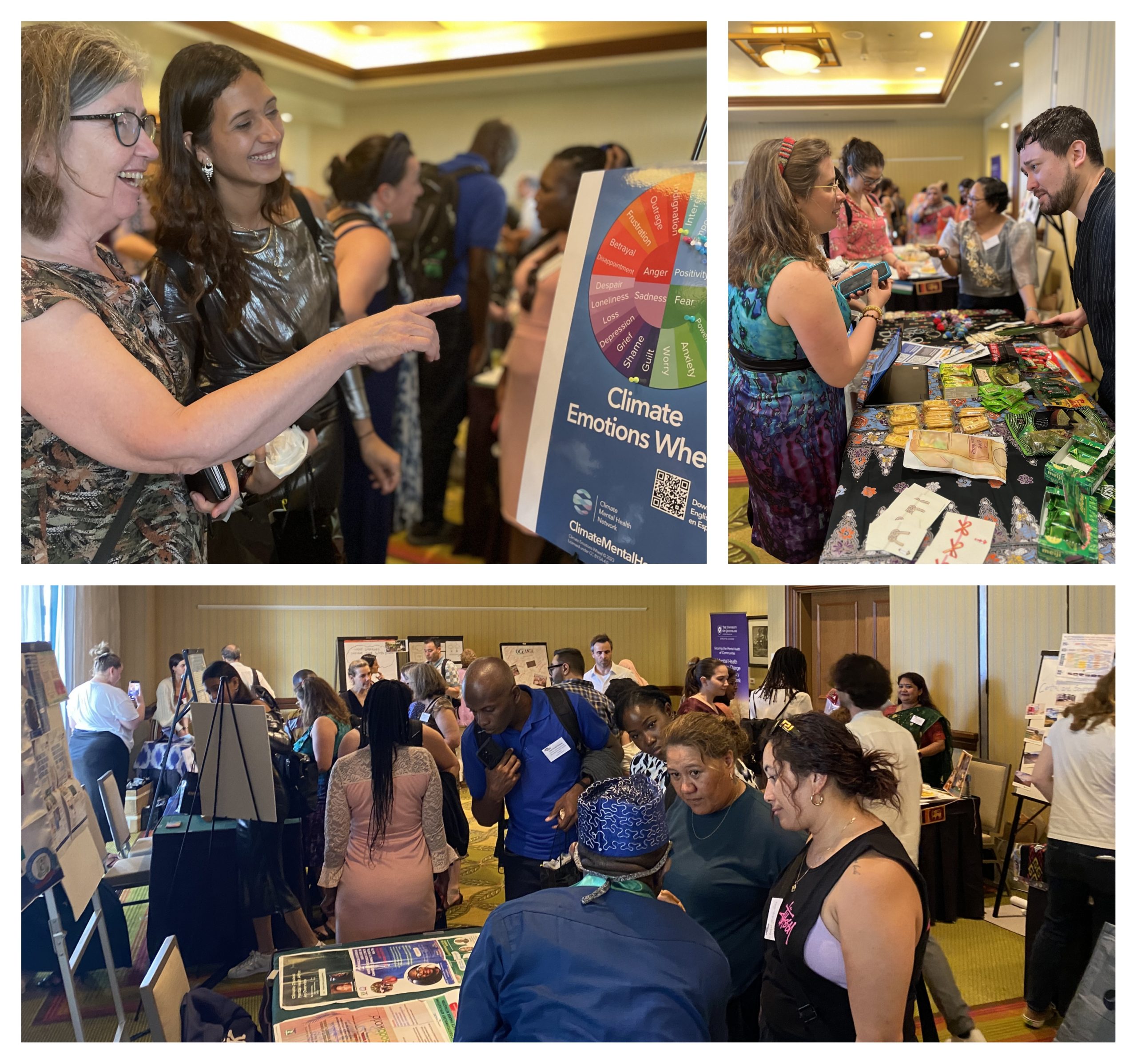
Research for People and Planet: All Work is Lived Experience Work
Lived experience is a foundational source of expertise to engage in when addressing the mental health consequences of climate change and the benefits of climate action. In this session, the Lived Experience Working Group delved into the diverse lived experiences they brought into the CCM project which have often been overlooked in previous research efforts. They stressed the importance of decolonising research practices and advocating for data sovereignty and the value proposition for communities. Through a storytelling circle, they shared a range of narratives and research themes drawn from the Community Agendas with Indigenous Nations and Peoples, youth, and small farmers and fisher people. The session also discussed potential pathways for future progress.
[youtube https://www.youtube.com/watch?v=hNq8XWYw7Ig?si=okB-2Bx-9t3MuZFq]
All public sessions such as the lived experience session, regional spotlights and keynotes are now available to re-watch on the Global Event platform.
What’s next? The Global Research and Action Agenda on Climate Change and Mental Health!
In addition to listening to the wonderful contributions from keynote speakers, the Regional Community Convenors and the Lived Experience Working group participants had the opportunity to interact with and feedback on the Global Research and Action Agenda. They also discussed the dissemination of project outputs and strategies for sustaining the momentum generated by Connecting Climate Minds so far. The valuable insights shared during the breakout sessions are currently undergoing analysis and integration by the Climate Cares team. After multiple upcoming rounds of review, we expect the launch of the Global Research and Action Agenda for Climate Change and Mental Health in July 2024.
To learn more about the next steps, connect with our research and the global climate and mental health community: Connecting Climate Minds Hub
